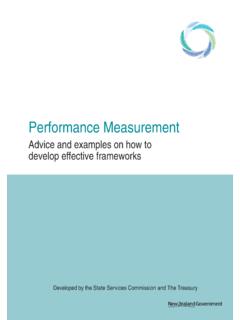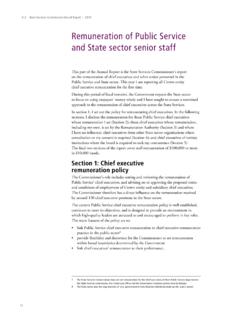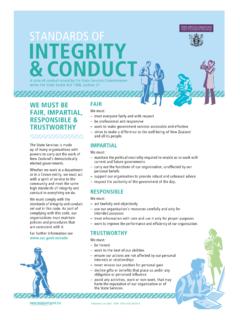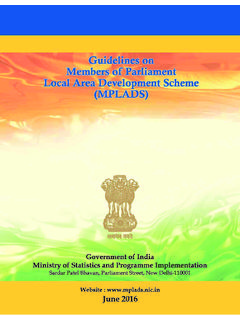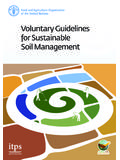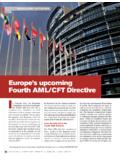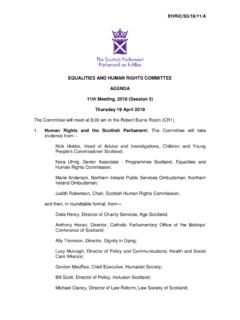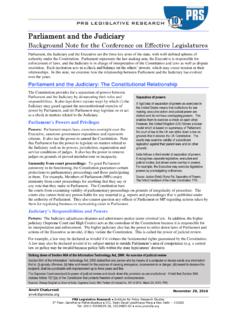Transcription of Officials and Select Committees – Guidelines
1 Officials and Select Committees Guidelines State Services Commission, Wellington August 2007. ISBN 978-0-478-30317-9. Contents Executive Summary 3. Introduction: The Role of Select Committees 4. Application of these Guidelines 4. Officials and Select Committees : General Principles 5. Officials as Witnesses 6. Departmental Officials 6. Officials in the wider State Sector 7. The Provision of Information to Committees 7. Private or Secret Evidence 9. Officials as Advisers 10. members ', Private and Local Bills 11. Attendance by Ministers and the Role of Officials 12. Contempt of the House 12. Misleading a Committee 12. Objections to Answering Questions 13. Threatening or disadvantaging a witness or adviser 13. Access to Counsel 14. Correction of Evidence 14. Natural Justice 14. Financial Veto 14. Attendance in a Personal Capacity 14. Appendix 1 - Natural Justice 15. Alleged Criminal Activity 15. People Whose Reputation May be Seriously Damaged by Committee Proceedings 15.
2 Witnesses 16. Appendix 2 Further References 17. Executive Summary These Guidelines apply to members , office holders, and committee members in Crown entities and State-owned enterprises, as well as to public servants and personnel in other agencies comprising the State Select Committees have considerable powers at their disposal to summons witnesses and require the production of information. Officials from within the State Sector may be called upon to attend Select Committees as witnesses (in relation to the Estimates, financial review, petitions or inquiries), or as advisers (the usual position in relation to bills). The House of Representatives must get free and frank answers and evidence from those who appear before its Committees . Parliamentary proceedings are subject to absolute privilege, to ensure that those participating in them, including witnesses before Select Committees , can do so without fear of external consequences.
3 In addition, Officials must operate within the framework of accountability to Ministers who are in turn accountable to the House. As a result, there is sometimes a tension between the absolute privilege of the House on the one hand, and the accountability of agency personnel in the State Sector to Ministers on the other. Pressure must not be placed on those appearing before a Select committee, in order to deter them from giving advice or evidence, nor should action be taken against them as a direct consequence of their giving evidence. Conduct in breach of this rule could lead to punishment by the House for contempt. However, Officials from State Sector agencies appear before Select Committees in support of Ministerial accountability, and their conduct must be consistent with this. Therefore, at a minimum, they have an obligation to manage risks and spring no surprises on the Minister. This is the case even when Officials appear on matters which do not involve Ministerial accountability, such as when they exercise an independent statutory responsibility or appear in a personal capacity.
4 Public service departments must remember that they cannot make a submission on a bill without the specific approval of the Cabinet Legislation Committee. In the case of Officials from agencies in the wider State Sector, who wish (or are invited) to make a submission to a Select committee on any matter, they are expected to discuss the matter first with the responsible Responsibility for justifying Government policy, explaining how it was developed, or commenting on alternative policy proposals, ultimately rests with Ministers. 1. The public service departments are listed on the First Schedule of the State Sector Act 1988. The term State Sector agency broadly refers to central government agencies which are either owned or controlled by the Crown through Ministers (often referred to as the agency's appropriate, responsible, or shareholding Minister). 2. Cabinet Manual 3. Introduction: The Role of Select Committees 1 These Guidelines are concerned with the attendance and conduct of Officials before Select Committees .
5 Select Committees are key parliamentary institutions with which public servants and those working in the wider State Sector have contact. The Committees undertake detailed work on a range of different matters on behalf of the House, and report their findings to it. Their work includes: - The detailed scrutiny of bills (except appropriation and imprest supply bills, and those considered under urgency);. - Examination of the Estimates;. - The review of departmental and agency performance;. - International treaty examinations;. - Petitions; and - Conducting inquiries. 2 Some Select Committees have specialised functions in addition to, or instead of those listed above. Examples include the Regulations Review, Officers of Parliament, Finance and Expenditure, Privileges and Standing Orders The House may establish other Committees in addition to these if it wishes. 3 The House of Representatives has considerable powers of inquiry, including the ability to send for "persons, papers and records.
6 4 Committee membership is drawn from Government and Opposition members of the House of Representatives. Ministers are not normally appointed to Select Committees . The Government does not necessarily have a majority of members on every committee. 5 These Guidelines have been revised in response to the recommendations in the Privileges Committee report: Question of Privilege on the Action Taken by TVNZ in relation to its Chief Executive, Following Evidence He Gave to the Finance and Expenditure Committee (October 2006).4 The Privileges Committee recommended that the State Services Commission should provide guidance to the boards of Crown entities and State enterprises on their responsibilities to and relationships with Parliament, and that the SSC. Guidelines should be revised regarding witnesses who appear before Select Committees . Application of these Guidelines 6 The previous Guidelines issued by the State Services Commission primarily applied to public servants, with some brief additional material for those working in the wider State Sector who less commonly attend Select Committees .
7 In these revised Guidelines , the term Officials refers to both public servants and personnel in agencies in the wider State Sector, unless the specific context indicates For present purposes, Officials includes board members , office holders, and employees of Crown entities and State owned enterprises. The Guidelines will also be applicable to Officials in non public service departments such as the New Zealand Police, as well as being relevant to a diverse range of other agencies in the State Sector. 3. Standing Orders 197 199. 4. Public Servants and Select Committees Guidelines (SSC, 2004). 5. Public service departments are listed in the First Schedule of the State Sector Act 1988. The Crown Entities Act 2004 defines official as including members , office holders and employees of Crown entities (s 135). 4. Officials and Select Committees : General Principles 7 Officials appearing before Select Committees should be alert to the environment in which they operate, particularly the parliamentary environment.
8 Parliament expects, and is entitled to receive, full and honest answers and evidence from those who appear before its Select Committees . 8 Public servants serve the Government of the day, within the framework of the law. Public service chief executives are responsible to the Minister for carrying out the functions of their departments, advising their Minister and other Ministers, and for the general conduct and efficient, effective, and economical management of their Departments (State Sector Act 1988, s 32). Ministers, in turn, are accountable to the House for Government policy and the activity of departments for which they are responsible. 9 Officials appearing before a Select committee on behalf of a State Sector agency do so in support of Ministerial accountability. They are ultimately answerable to the Minister of the agency, who is in turn accountable to the House for the operations of the agency. Within this accountability framework, the precise relationship between the Minister and the official may vary depending on the type of State Sector agency the official works in, and its enabling Act or 10 In the wider State Sector, the most regular contact agencies have with Committees is for financial reviews, inquiries, and occasionally as submitters on bills.
9 The agency's specific obligations to its Minister may depend partly on its enabling legislation or constitution, and partly on convention. Some agencies may be legally responsible for carrying out the functions and powers, distinct from the Crown. In some cases they may be expressly required to carry out these independently of Ministers (eg, Independent Crown entities). Nevertheless, they are generally accountable to a Minister for their operations and performance. 11 Officials appearing before Select Committees have an obligation to manage risks and spring no surprises on the Minister. This is the case even when they appear on matters which do not involve Ministerial accountability, such as when they exercise an independent statutory responsibility or appear in a personal capacity. 12 Requests from Select Committees for Officials to provide services, particularly when these fall outside the usual cycle of business between agencies and Select Committees , should be reported to the Minister, and undertaken only with the Minister's approval.
10 13 Officials must act responsibly and in good faith in relation to Select Committees , and answer questions truthfully and to the best of their ability. Officials should assist Committees by providing complete and accurate information, although the provision of information may be subject to the restrictions discussed in more detail in paragraphs 24. to 34 below. Information should be provided in accordance with the Official Information Act 1982 principle that information shall be released unless there are good reasons for withholding it. However, the OIA does not formally constrain the powers of the House. 14 Officials are not ultimately responsible for the release of information to Select Committees - that is the Minister's Responsibility for justifying Government policy, explaining how it was developed, or commenting on alternative policy proposals, also ultimately rests with Ministers. Officials should not comment on 6. Under s 3 of the Crown Entities Act 2004, for example, accountability relationships between Crown entities, their board members , their responsible Ministers on behalf of the Crown, and the House of Representatives are recognised.
